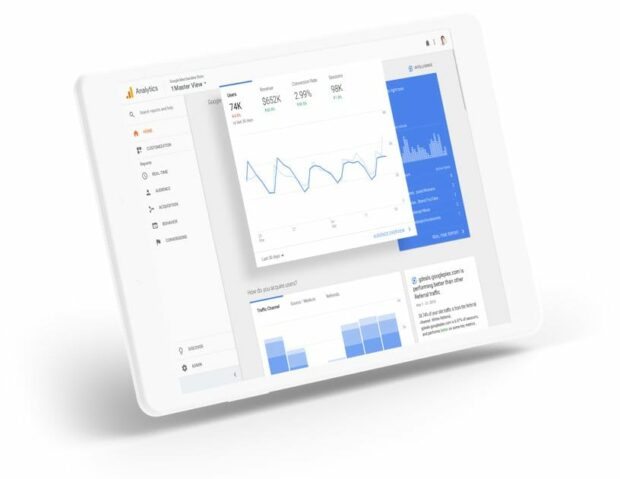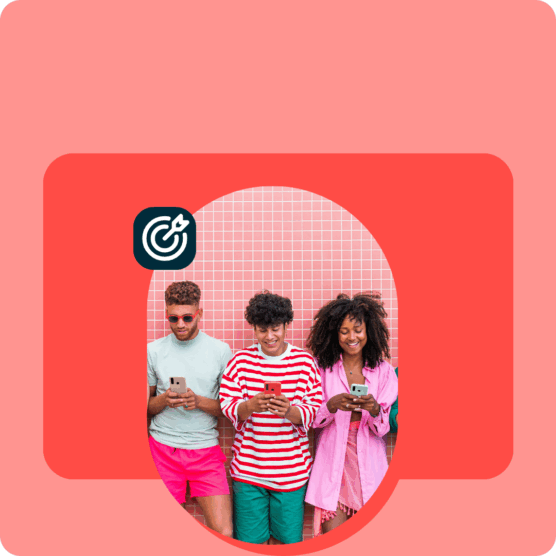It doesn’t really matter what you’re selling. Ultimately, any brand on social media is in the business of social media lead generation.
Whether you’re an ice cream maker or a funeral director (representing the full spectrum of possible jobs), social media offers an opportunity to scope out a whole world of future clients.
You already know how helpful social media can be for brand awareness and engagement: today, we’re digging into just how marketers can use platforms like Facebook, Tiktok, Instagram, and LinkedIn to generate sales leads.
Social media can help you find people interested in what your business has to offer — and, importantly, it can help you keep in touch with those potential customers to let them know about news and special offers.
Ready to use social media marketing to generate and nurture quality leads? Welcome to Social Media Leads 101. Class is in session.
Social media leads are potential future customers.
Any time you collect information from a social media user that will allow you to follow up with them, you’ve just snagged yourself a new lead.
Maybe that’s just their name, maybe you’ve got an email address or some info about their employer. If you have a way to contact and connect with a potential client on social media, congratulations: you’ve scored a social media lead.
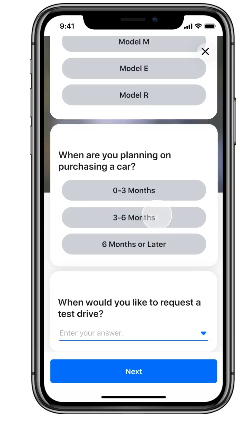
Source: Facebook
Social media lead generation is any activity undertaken on social media that allows you to collect new leads.
That could mean creating great content to attract new followers. It might mean spending a few bucks on targeted ads. Whatever you’re doing that pulls in that all-important contact info for reaching potential future clients: that’s social media lead generation. (We’ll dig into some more specific ideas for social media lead generation efforts below, stay tuned.)
Social media lead generation is the first stage of social media selling. Lead generation is followed by:
- Social media lead nurturing This is the act of building relationships with those potential customers.
- Social media lead conversion This is the stage of social media selling where you finally close the deal and make that sale.
Want to use social media to generate sales leads? Here are 13 ways to attract new potential customers with social marketing techniques.
Optimize your profile
Your social media profile should be a one-stop shop for social media users to learn about what you do and hopefully get inspired to follow you or click through to your website.
Here are 10 tips for crafting the perfect social media profile, but the TLDR of it all is: do what you’ve gotta do to make a great first impression.
Make sure your profile is filled out completely with your relevant business description (make it keyword-heavy to optimize that social SEO!) and that you’ve got a working URL that directs people to a compelling landing page.
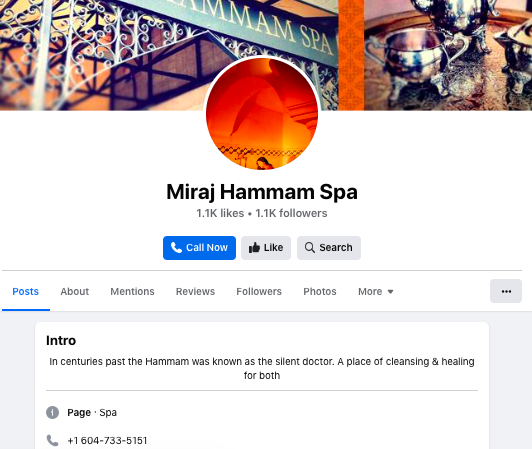
Pro tip: use a UTM code to track click-throughs on your social media profile. More on using UTM for performance tracking here!
Schedule posts for the right time
It’s going to be pretty tough to dazzle potential clients if they never see your content. Scheduling your posts to go live at the right time is critical to generating social media leads (and engagement in general).
Use a scheduling tool like Hootsuite to ensure your posts are going up at the right time to capture your audience’s attention.
Create clickable content
The best way to attract sales leads is to offer something of value — on social media, that means posting compelling, clickable content.
Every time you craft a hilarious video, a beautiful infographic, or a thought-provoking essay caption, you’re putting out the bait to lure in potential future clients. Don’t you want to watch this video of ceramicist Rachel Saunders pouring coffee on repeat? And then maybe one day, buy one of these sick mugs?
To really collect sales leads, though, you aren’t just trawling for views. You want to earn new followers, comments, and click-throughs. These are metrics that will give you the info you need to target specific users in phase two of the social selling game: nurturing your leads.
Here are a bunch of ideas to get you started creating high-engagement posts.
Customer testimonials
Intrigue your potential customers with stories from your past or current customers. Share client testimonials, user-generated content, and real-life case studies in blog posts or other formats to offer social proof that your business is legitimate and your brand is worth engaging with.
For instance: look at this real-life person wearing Franc’s workout wear! It always makes a product a little more appealing when you can see someone (even a stranger) using it happily in the wild, no?
Design user-friendly landing pages
Once you’ve actually convinced someone to click through to your website, it’s make-it-or-break-it time. If you’re lucky, they’ll carry on to actually make a purchase or book your services (awwww yeah) — but, really, at this stage, just collecting some contact info is a win.
Have a landing page that gives visitors an opportunity to submit their contact info to learn more. Maybe it’s literally a form that says, “Submit your contact info to learn more!” but this can also be a newsletter sign-up or a prompt to access gated content.
Clicking through from the Instagram profile to the homepage of Circle Wellness Spa offers a clear call to action, inviting visitors to “Join the waitlist” for its thermal spa experience. Doesn’t get much more user-friendly than that. (And now we sit back… and wait.)
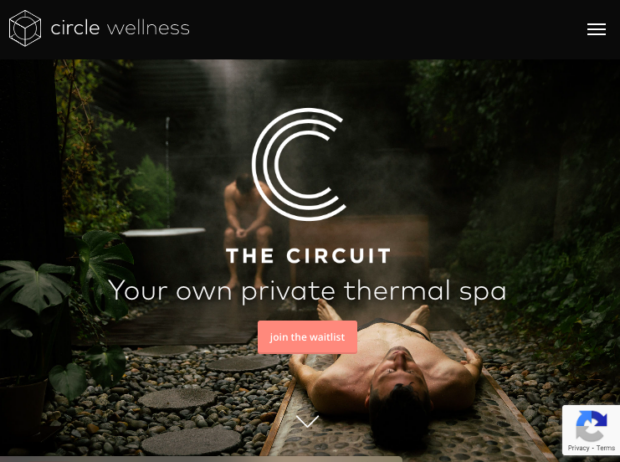
If you’re exploring social media ads (more on that next!), tracking pixels are another way to turn a lead’s landing page visit into an info-gathering experience.
Targeted ads
Social media ads are a great way to generate leads, particularly because social media platforms allow super-specific demographic targeting. You can share your amazing pitch with a hyper-segmented audience — ideally, the people most likely to buy from you.
Ad campaigns can be built specifically for lead generation and include a call to action that asks for contact info.
With a Facebook lead ad or Instagram lead ad (both built using Meta Business Manager), you can prompt viewers to fill out a contact form… and Facebook will pre-populate that form with users’ information. In just a few taps, you’ve got a rock-solid lead for your biz.
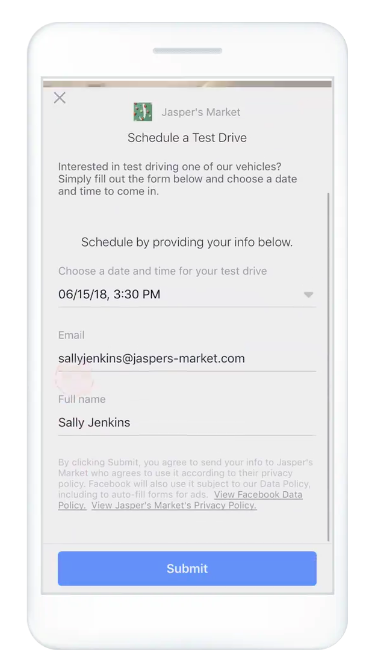
Source: Facebook
LinkedIn Lead Gen forms also help collect quality leads with pre-filled lead forms in message ads and sponsored content.
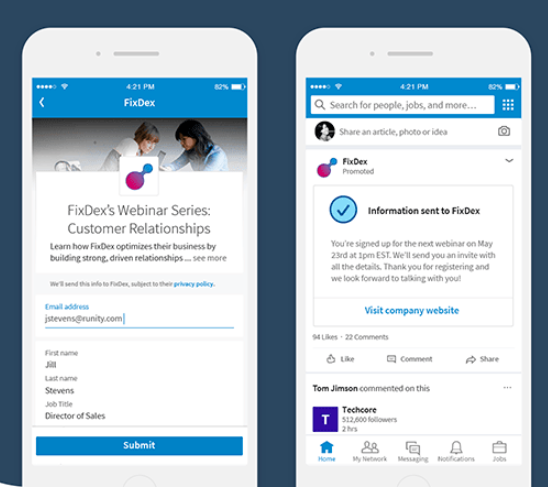
Source: LinkedIn
TikTok’s new lead generation ad objective helps social media managers easily collect info, too. A prompt allows ad-viewers to learn more about your business, answer your questions, schedule an appointment, or share contact information with you.
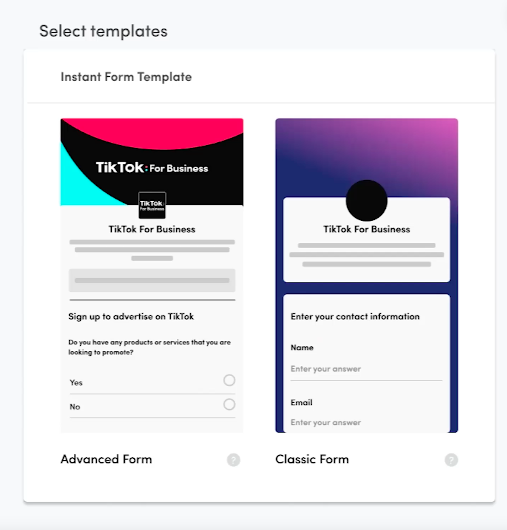
Source: TikTok
Social listening
Social listening is the act of monitoring social media platforms for mentions or discussions of your brand, products, campaigns, or industry. (Hootsuite’s Streams feature makes this super easy and compiles all this intel from all of your social platforms in one place.) By keeping an eye on the conversation out there on the world wide web, you’ve got a chance to spot potential clients.
Say you’re a sneaker company, and you set up your competitor’s brand name as a social-listening search. The next time someone complains on Twitter that the shoelaces of their New Balances are too long, you can swoop in and humbly suggest your product as an alternative. (Or something more subtle: you do you.) That cranky Tweeter is officially your newest social media lead. Mazel tov!
Offer incentives
Information is a valuable thing — why should anyone want to give it to you for free? A trade, on the other hand, is a whole different story.
Offer up an incentive for someone to share their contact info with you, and you’ll find yourself awash in the email addresses of potential customers. A real “you scratch my back, I’ll scratch yours” sort of deal.
This works especially well for referral campaigns, where you encourage existing customers to share your brand with their friends and family in return for a discount.
There are plenty of different things you can consider offering in exchange for content info:
- Social media contests (here are 12 creative social media contest ideas to try!)
- Gated content (like this McKinsey report!)
- Discount codes or special offers
- Webinars
- Newsletters (like WealthSimple’s)
- Whitepapers or research documents
- Exclusive thought leadership
Use social media chatbots
Offering great customer service is sort of Business 101. And in this day and age, that means offering great social media customer service, too.
What does this have to do with lead generation strategy? Customer service encompasses the way you treat your future customers, as well as your current ones: you’ve got to be ready to help curious would-be shoppers the second they reach out. Anyone who sends you an exploratory message, after all, is a lead just waiting to be nurtured.
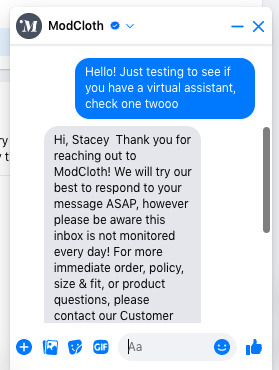
Of course, no matter how extremely online you and your employees are, there’s no way to offer instantaneous, 24/7 support… without a little help.
Conversational AI chatbots can fill that gap and help you help others. Ensure no sales lead gets lost by setting up a messenger or DM virtual assistant that can help address FAQs without requiring any human manpower. With the help of ol’ Botty, this future customer gets an efficient, positive customer service experience, and you collect a contact you can use for future social selling.
Personalize your pitch
Personalization is a powerful thing. Seventy-one percent of consumers expect personalization in their interactions — no wonder that the global revenue affiliated with customer service personalization software is about to surpass $9 billion.
Many social media platforms offer personalization functionality for targeted ads. After all, they’ve got the names of all their users right there for the taking: it’s simple for the ad-building robots to plug those right in. (Just look at that sweet personal note from the ModCloth Facebook Messenger Bot in the example above!)
And when Jerome sees an ad in his feed that says, “Hey Jerome! Are you ready to try our new brand of direct-to-consumer margarine?” he’ll probably feel pretty special. (And isn’t that really what social selling is all about?)
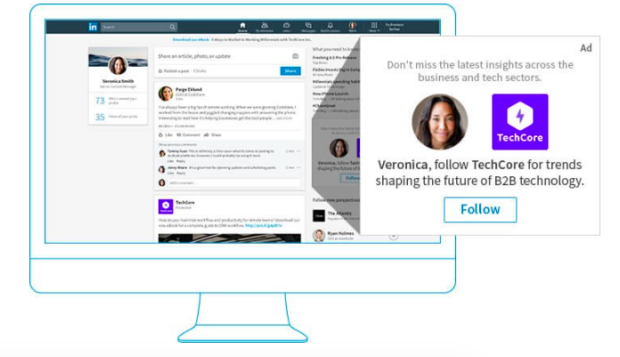
Source: LinkedIn
Host a livestream event
A social media livestream is an exciting and engaging way to connect with your followers (or lookie-loos) — no big expensive venue required.
Whether you’re hosting a Q&A or a behind-the-scenes tour or putting on your own masterclass, livestreams are a great way to offer educational value or entertainment in an interactive way.
Use the livestream to plug your other products and services, direct viewers to a sign-up form to “learn more,” and encourage newcomers to follow you to learn even more.
Sponsor content creators
To reach a bunch of new leads at once, consider teaming up with a social media content creator.
Whether it’s an organic partnership or a paid one, tapping into another channel’s audience is a great way to spread your message further… and hopefully earn some new, concrete sales leads in the process.
Dive into analytics
Your social media analytics offer candid insights into how things are going over there in social media land.
What posts are garnering comments? What are people saving? How many new followers are coming in? Who has clicked through on your profile link to your website… and did they sign up for access to your gated 2023 Report on the Caramel Corn Industry?
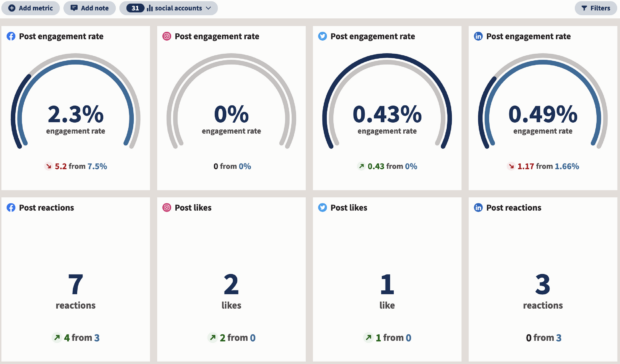
Learning what’s working (and what’s not!) is key to generating social media leads. Use your social media metrics to get smarter about your content planning so you can pull in more followers — each one a potential sales lead.
When you buy a magazine ad or place a billboard on the side of the highway, there’s no real way to measure how many people saw it… and if they did see it, there’s no way to know whether that inspired them to patronize your business.
With social media selling, that is not the case at all. With the right tools, it’s possible to see exactly how many leads you’ve collected on social media each day (or week or year).
UTMs
UTMs are special tracking tags that you can add to the end of a URL. Use these strategically as you share links to keep track of where traffic is coming from.
For instance, make one UTM for Twitter and another for Facebook. These unique codes will help identify which website visitors came from where. Learn more about UTMs here.
Web analytics
Use Google Analytics or your website’s back-end analytics software to check just where traffic is coming from. Are you getting a spike from Youtube, or are all the people visiting your “Book an appointment!” page coming from Instagram?
Track engagement
When you measure interaction with any given post, you’re getting a quantitative look and just how successful your messaging is… which ultimately is the first step in driving your audience down that sweet ol’ sales funnel to conversion.
Track comments and likes: these show that your content resonates and inspires followers to react. Shares and saves are valuable, too, indicating that your audience finds your content helpful. Of course, click-throughs are another form of engagement too — and a move in the right direction through the sales funnel.
Ask “How did you hear about us”
OK, it’s a little old-fashioned, but hear us out. If you want to know where your leads are coming from, maybe just… ask?
When you’ve compelled someone to fill out a contact form for more info or offered them a free ebook on Home Silversmithing Techniques, you’ve got a chance to add a field that straight-up asks, “Where did you hear about us?” Similarly, you can ask this at the final stage of the sales process too, once you’ve got their cold hard cash in hand.
What are the best social media platforms for lead generation?
The best social media platform for lead generation really depends on your particular business and your particular audience. It’s a boring answer. We get it. But it’s true.
TikTok can be an amazing social media lead generator if you’re looking to sell to Gen Z. It’s a platform with plenty of opportunity for discoverability and one where users are actively looking to engage with brands and seek shopping recommendations.
But if you’re a B2B brand, on the other hand, LinkedIn is going to be a far better fit. The users here are middle managers and decision-makers. Marketers see up to 2x higher conversion rates for B2B sales and 2X high engagement rates. (See more LinkedIn stats here.)
Of course, if you’re just anxious to reach the most people humanly possible, Facebook is going to be your best bet — it’s currently the most popular social media platform in the world, with an audience of 2.9 billion.
Long story short: if you’re looking to compile sales leads via social media, you’re going to need to figure out first just who your target audience is, and where they’re hanging out online. Here’s our guide to determining your social media target market.
Once you’ve figured out your key outlet (or outlets), you’ll be ready to engage with your target audiences using the proper tropes, etiquette, and best practices — and ultimately pull in that all-mighty contact info.
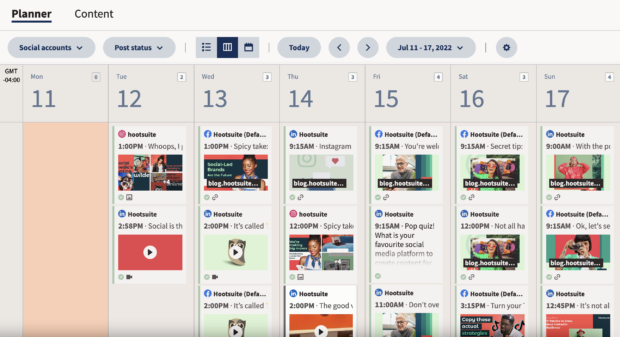
Hootsuite
One of the best things about an all-in-one social media dashboard like Hootsuite is that you can juggle all of your social media platforms in one place. You can be hunting for leads across LinkedIn, Facebook, Twitter, and beyond, in one easy-to-navigate tab.
Hootsuite is also great for…
- Scheduling posts designed to generate leads
- Generating UTMs for tracking the performance of posts
- Analytics to help understand what’s working and what’s not
- Responding and messaging sales leads (and offering seamless customer service) with the Hootsuite Inbox tool
Google Analytics
It’s the OG website analytics tool, able to provide data about exactly where leads on your website have come from. Want to know which social media platforms are driving the most traffic to that newsletter signup form or which post is responsible for a burst of activity on your “Learn more” landing page? Google Analytics will show you the sources for all your website visitors.
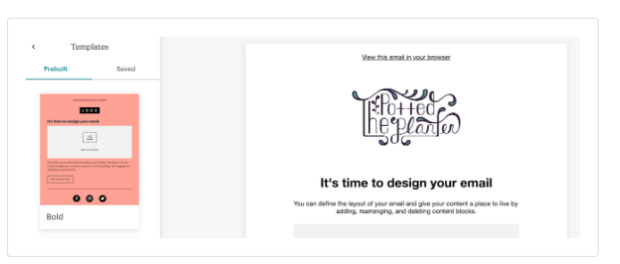
Source: MailChimp
MailChimp
What can you offer someone in exchange for their contact info? A newsletter is a pretty good one (and MailChimp is a fave newsletter-building tool). You get a chance to grab their attention right in their inbox regularly, they get delicious new content to feast on. Seems like a pretty good deal to us.
Use your social media accounts to direct users to sign up for this exclusive correspondence and watch those emails come rolling in.
Social media lead generation statistics
The most important number to keep in mind as you’re on your social selling journey is that 4.74 billion people worldwide are active on social media. That’s… a lot. It’s also a number that confirms just why social media is such a powerful tool for lead generation.
- 77% of people discover new products on social media
- 62.3% of Instagram Users follow or research brands and products; 54.9% of Facebook users say the same.
- 49.2% of social media users worldwide log on to learn about brands and see their content
- Social media platforms gained 190 million active users in 2022 alone
- 27% of internet users use social media platforms to find inspiration for things to do and buy, while 26.2% are seeking products to purchase
- 70% of shoppers look for their next purchase on Instagram
- 37% of Facebook users will make a purchase on the platform in 2023
- More than 200 million Instagram users visit a profile at least once a day, and half of people say they use Instagram weekly to shop
- 87% of viewers trust Youtube creators to give trustworthy recommendations
For more compelling numbers about social selling, check out this comprehensive post with more than 160 social media statistics that matter to marketers.
What are social media lead-generation companies?
There aren’t really companies exclusively for social media lead generation. You’re on your own, kid!
In the sales world, generally speaking, “lead generation companies” collect consumer data to sell to other businesses. They’ll sort these leads into different categories so they can sell specific, relevant contacts to you.
However… companies and products exist to help you collect or reach social media leads. Social media platforms themselves sell a type of ad specifically designed for lead generation.
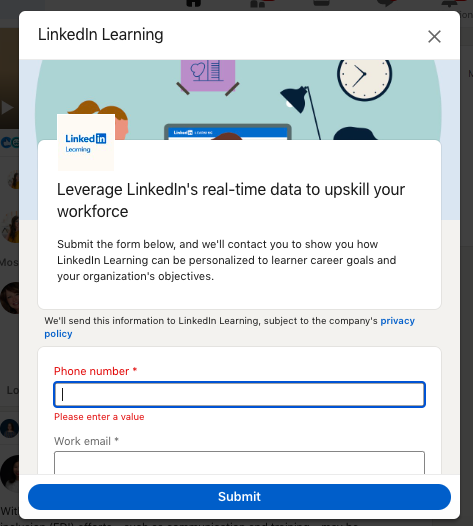
Companies like Hootsuite can help you generate leads with tools that make outreach, monitoring, and tracking efficient and effective.
What is an example of lead generation?
An example of lead generation on social media would be creating a post on LinkedIn that drives people to a contact-info collection form.
Another example? Buying a lead-generation ad on Facebook that was targeted at a specific demographic, with a call-to-action to share their contact info.
How do you nurture leads on social media?
Nurturing leads on social media is the act of fostering positive relationships with your leads. These are potential customers: people who haven’t necessarily spent any money with you but might one day if you treat ‘em right.
Nurturing a lead means building a relationship, either one-on-one or with the public content you share with all your followers.
Create engaging content with value. Cultivate community and encourage interaction. Answer questions and respond to all comments (pro tip: use Hootsuite’s Inbox tool to make sure you never miss a message).
Social listening is another important tool for nurturing your social media leads. Set up streams to monitor relevant conversations so you can participate meaningfully and authentically when appropriate.
In other words: be a good friend who’s fun to be around. No one likes a pushy salesperson. Nurturing a lead is all about building a relationship and a positive reputation so that when the time does come for that lead to drop some dough, you’re top of mind.
Explore more advice for community engagement and offering great social media customer service here.
Save time managing your social media presence with Hootsuite. From a single dashboard you can publish and schedule posts, find relevant conversions, engage the audience, measure results, and more. Try it free today.

